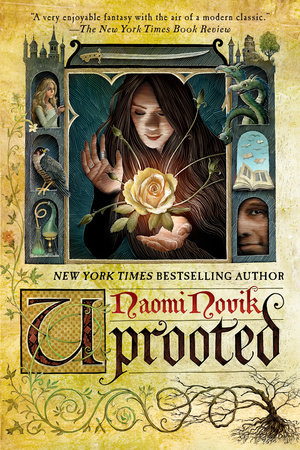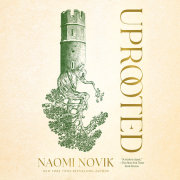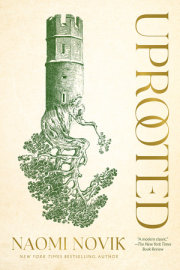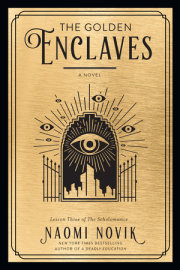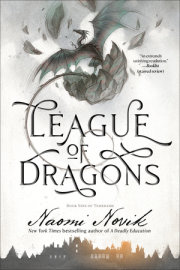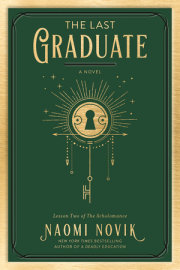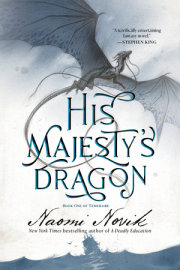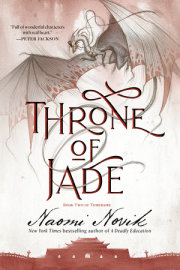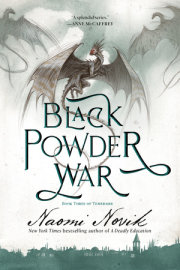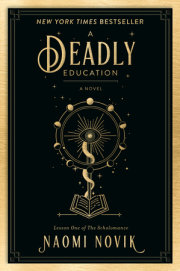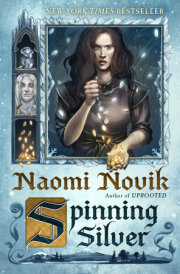Chapter 1
Our Dragon doesn’t eat the girls he takes, no matter what stories they tell outside our valley. We hear them sometimes, from travelers passing through. They talk as though we were doing human sacrifice, and he were a real dragon. Of course that’s not true: he may be a wizard and immortal, but he’s still a man, and our fathers would band together and kill him if he wanted to eat one of us every ten years. He protects us against the Wood, and we’re grateful, but not that grateful.
He doesn’t devour them really; it only feels that way. He takes a girl to his tower, and ten years later he lets her go, but by then she’s someone different. Her clothes are too fine and she talks like a courtier and she’s been living alone with a man for ten years, so of course she’s ruined, even though the girls all say he never puts a hand on them. What else could they say? And that’s not the worst of it—after all, the Dragon gives them a purse full of silver for their dowry when he lets them go, so anyone would be happy to marry them, ruined or not.
But they don’t want to marry anyone. They don’t want to stay at all.
“They forget how to live here,” my father said to me once, unexpectedly. I was riding next to him on the seat of the big empty wagon, on our way home after delivering the week’s firewood. We lived in Dvernik, which wasn’t the biggest village in the valley or the smallest, or the one nearest the Wood: we were seven miles away. The road took us up over a big hill, though, and at the top on a clear day you could see along the river all the way to the pale grey strip of burned earth at the leading edge, and the solid dark wall of trees beyond. The Dragon’s tower was a long way in the other direction, a piece of white chalk stuck in the base of the western mountains.
I was still very small—not more than five, I think. But I already knew that we didn’t talk about the Dragon, or the girls he took, so it stuck in my head when my father broke the rule.
“They remember to be afraid,” my father said. That was all. Then he clucked to the horses and they pulled on, down the hill and back into the trees.
It didn’t make much sense to me. We were all afraid of the Wood. But our valley was home. How could you leave your home? And yet the girls never came back to stay. The Dragon let them out of the tower, and they came back to their families for a little while—for a week, or sometimes a month, never much more. Then they took their dowry-silver and left. Mostly they would go to Kralia and go to the University. Often as not they married some city man, and otherwise they became scholars or shopkeepers, although some people did whisper about Jadwiga Bach, who’d been taken sixty years ago, that she became a courtesan and the mistress of a baron and a duke. But by the time I was born, she was just a rich old woman who sent splendid presents to all her grand-nieces and nephews, and never came for a visit.
So that’s hardly like handing your daughter over to be eaten, but it’s not a happy thing, either. There aren’t so many villages in the valley that the chances are very low—he takes only a girl of seventeen, born between one October and the next. There were eleven girls to choose from in my year, and that’s worse odds than dice. Everyone says you love a Dragon-born girl differently as she gets older; you can’t help it, knowing you so easily might lose her. But it wasn’t like that for me, for my parents. By the time I was old enough to understand that I might be taken, we all knew he would take Kasia.
Only travelers passing through, who didn’t know, ever complimented Kasia’s parents or told them how beautiful their daughter was, or how clever, or how nice. The Dragon didn’t always take the prettiest girl, but he always took the most special one, somehow: if there was one girl who was far and away the prettiest, or the most bright, or the best dancer, or especially kind, somehow he always picked her out, even though he scarcely exchanged a word with the girls before he made his choice.
And Kasia was all those things. She had thick wheat-golden hair that she kept in a braid to her waist, and her eyes were warm brown, and her laugh was like a song that made you want to sing it. She thought of all the best games, and could make up stories and new dances out of her head; she could cook fit for a feast, and when she spun the wool from her father’s sheep, the thread came off the wheel smooth and even without a single knot or snarl.
I know I’m making her sound like something out of a story. But it was the other way around. When my mother told me stories about the spinning princess or the brave goose-girl or the river-maiden, in my head I imagined them all a little like Kasia; that was how I thought of her. And I wasn’t old enough to be wise, so I loved her more, not less, because I knew she would be taken from me soon.
She didn’t mind it, she said. She was fearless, too: her mother Wensa saw to that. “She’ll have to be brave,” I remember hearing her say to my mother once, while she prodded Kasia to climb a tree she’d hung back from, and my mother hugging her, with tears.
We lived only three houses from one another, and I didn’t have a sister of my own, only three brothers much older than me. Kasia was my dearest. We played together from our cradles, first in our mothers’ kitchens keeping out from underfoot and then in the streets before our houses, until we were old enough to go running wild in the woods. I never wanted to be anywhere inside when we could be running hand-in-hand beneath the branches. I imagined the trees bending their arms down to shelter us. I didn’t know how I would bear it, when the Dragon took her.
My parents wouldn’t have feared for me, very much, even if there hadn’t been Kasia. At seventeen I was still a too-skinny colt of a girl with big feet and tangled dirt-brown hair, and my only gift, if you could call it that, was I would tear or stain or lose anything put on me between the hours of one day. My mother despaired of me by the time I was twelve and let me run around in castoffs from my older brothers, except for feast days, when I was obliged to change only twenty minutes before we left the house, and then sit on the bench before our door until we walked to church. It was still even odds whether I’d make it to the village green without catching on some branch, or spattering myself with mud.
“You’ll have to marry a tailor, my little Agnieszka,” my father would say, laughing, when he came home from the forest at night and I went running to meet him, grubby-faced, with at least one hole about me, and no kerchief. He swung me up anyway and kissed me; my mother only sighed a little: what parent could really be sorry, to have a few faults in a Dragon-born girl?
Our last summer before the taking was long and warm and full of tears. Kasia didn’t weep, but I did. We’d linger out late in the woods, stretching each golden day as long as it would go, and then I would come home hungry and tired and go straight to lie down in the dark. My mother would come in and stroke my head, singing softly while I cried myself to sleep, and leave a plate of food by my bed for when I woke up in the middle of the night with hunger. She didn’t try to comfort me otherwise: how could she? We both knew that no matter how much she loved Kasia, and Kasia’s mother Wensa, she couldn’t help but have a small glad knot in her belly—not my daughter, not my only one. And of course, I wouldn’t really have wanted her to feel any other way.
It was just me and Kasia together, nearly all that summer. It had been that way for a long time. We’d run with the crowd of village children when we were young, but as we got older, and Kasia more beautiful, her mother had said to her, “It’s best if you don’t see much of the boys, for you and them.” But I clung to her, and my mother did love Kasia and Wensa enough not to try and pry me loose, even though she knew that it would hurt me more in the end.
On the last day, I found us a clearing in the woods where the trees still had their leaves, golden and flame-red rustling all above us, with ripe chestnuts all over the ground. We made a little fire out of twigs and dry leaves to roast a handful. Tomorrow was the first of October, and the great feast would be held to show honor to our patron and lord. Tomorrow, the Dragon would come.
“It would be nice to be a troubadour,” Kasia said, lying on her back with her eyes closed. She hummed a little: a traveling singer had come for the festival, and he’d been practicing his songs on the green that morning. The tribute wagons had been arriving all week. “To go all over Polnya, and sing for the king.”
She said it thoughtfully, not like a child spinning clouds; she said it like someone really thinking about leaving the valley, going away forever. I put my hand out and gripped hers. “And you’d come home every Midwinter,” I said, “and sing us all the songs you’d learned.” We held on tight, and I didn’t let myself remember that the girls the Dragon took never wanted to come back.
Of course at that moment I only hated him ferociously. But he wasn’t a bad lord. On the other side of the northern mountains, the Baron of the Yellow Marshes kept an army of five thousand men to take to Polnya’s wars, and a castle with four towers, and a wife who wore jewels the color of blood and a white fox-fur cloak, all on a domain no richer than our valley. The men had to give one day a week of work to the baron’s fields, which were the best land, and he’d take likely sons for his army, and with all the soldiers wandering around, girls had to stay indoors and in company once they got to be women. And even he wasn’t a bad lord.
The Dragon only had his one tower, and not a single man-at-arms, or even a servant, besides the one girl he took. He didn’t have to keep an army: the service he owed the king was his own labor, his magic. He had to go to court sometimes, to renew his oath of loyalty, and I suppose the king could have called him to war, but for the most part his duty was to stay here and watch the Wood, and protect the kingdom from its malice.
His only extravagance was books. We were well read by the standards of villagers, because he would pay gold for a single great tome, and so the book-peddlers came all this way, even though our valley was at the very edge of Polnya. And as long as they were coming, they filled up the saddlebags of their mules with whatever worn-out or cheaper stock of books they had and sold them to us for our pennies. It was a poor house in the valley that didn’t have at least two or three books proudly displayed upon the walls.
These might all seem like small and petty things, little enough cause to give up a daughter, to anyone who didn’t live near enough the Wood to understand. But I had lived through the Green Summer, when a hot wind carried pollen from the Wood west a long way into the valley, into our fields and gardens. The crops grew furiously lush, but also strange and misshapen. Anyone who ate of them grew sick with anger, struck at their families, and in the end ran into the Wood and vanished, if they weren’t tied down.
I was six years old at the time. My parents tried to shelter me as much as they could, but even so I remembered vividly the cold clammy sense of dread everywhere, everyone afraid, and the never-ending bite of hunger in my belly. We had eaten through all our last year’s stores by then, counting on the spring. One of our neighbors ate a few green beans, driven foolish by hunger. I remember the screams from his house that night, and peering out the window to see my father running to help, taking the pitchfork from where it leaned against our barn.
One day that summer, too young to understand the danger properly, I escaped my tired, thin mother’s watch and ran into the forest. I found a half-dead bramble, in a nook sheltered from the wind. I pushed through the hard dead branches to the protected heart and dug out a miraculous handful of blackberries, not misshapen at all, whole and juicy and perfect. Every one was a burst of joy in my mouth. I ate two handfuls and filled my skirt; I hurried home with them soaking purple stains through my dress and my mother wept with horror when she saw my smeared face. I didn’t sicken: the bramble had somehow escaped the Wood’s curse, and the blackberries were good. But her tears frightened me badly; I shied from blackberries for years after.
The Dragon had been called to court that year. He came back early and rode straight to the fields and called down magic fire to burn all that tainted harvest, every poisoned crop. That much was his duty, but afterwards he went to every house where anyone had sickened, and he gave them a taste of a magic cordial that cleared their minds. He gave orders that the villages farther west, which had escaped the blight, should share their harvest with us, and he even gave up his own tribute that year entirely so none of us would starve. The next spring, just before the planting season, he went through the fields again to burn out the few corrupted remnants before they could take fresh root.
Copyright © 2015 by Naomi Novik. All rights reserved. No part of this excerpt may be reproduced or reprinted without permission in writing from the publisher.

